Owning a company often entails drafting commercial agreement templates on a regular basis. When seeking an appropriate business contract, free template options might seem appealing; however, their simplicity can lead to confusion. Sometimes, it becomes necessary to consult an exemplary business agreement that lacks a readily available template format.
The deeper your understanding of commercial agreement composition and the elements that constitute a solid contract, the better equipped you’ll be to generate the proper paperwork for your requirements. With a well-structured business agreement template as a foundation for your contractual needs, you can develop the appropriate documents for the myriad of collaborations you’ll forge while overseeing your enterprise.
Table of Contents
Business Contract Templates
Business contract templates are essential tools that streamline the process of creating legally binding agreements between parties involved in a wide range of business transactions. These templates serve as a foundation for documenting the terms and conditions, rights, and responsibilities of each party, ensuring clarity, protection, and enforceability. Whether you’re a small business owner, entrepreneur, freelancer, or a seasoned professional, understanding and utilizing business contract templates can significantly expedite the contract creation process while mitigating potential risks and disputes.
Business contract templates offer a practical and efficient approach to creating comprehensive and legally binding agreements. By leveraging these templates, businesses can streamline their contract creation process, reduce legal risks, and establish clear expectations and obligations for all parties involved. Customizing templates and seeking professional advice when necessary empowers organizations to craft contracts that accurately reflect their unique circumstances, ensuring successful and harmonious business relationships.
What is a Business Contract?

A business contract is a legally binding agreement between two or more parties outlining the terms and conditions of a business relationship or transaction. These contracts are crucial in establishing the rights, responsibilities, and obligations of each party involved. Business contracts can cover various aspects, such as the sale of goods or services, intellectual property rights, confidentiality, employment, partnership agreements, and more.
Typically, a business contract contains essential elements such as offer, acceptance, consideration, and mutual consent to create a valid agreement. A well-drafted contract helps to ensure that all parties understand their respective duties, protects their interests, and reduces the risk of disputes or misunderstandings arising in the future. In case of any breach or violation of the contract, the involved parties may seek legal remedies, including monetary compensation or specific performance, to enforce the terms of the agreement.
What’s the purpose of a Business Contract ?
A business contract serves several important purposes in professional relationships between parties. Some of the key purposes include:
Defining the terms and conditions: A business contract clearly outlines the rights, responsibilities, and obligations of each party involved in the transaction. It provides a framework for what is expected from each party, setting the foundation for a smooth and successful business relationship.
Establishing a legal framework: Business contracts are legally binding documents, which means they establish a legal framework for the parties involved. They set forth the applicable laws and jurisdiction, providing legal protection and recourse in case of disputes or breaches of the contract terms.
Reducing misunderstandings and disputes: By providing clear and detailed terms, a well-drafted business contract helps minimize the risk of misunderstandings and disputes between the parties. It ensures that all parties have a common understanding of their roles, responsibilities, and expectations, which can prevent disagreements and promote a harmonious working relationship.
Allocating risk: Business contracts help allocate and manage risk by outlining each party’s responsibilities and obligations. They may include indemnification clauses, limitation of liability provisions, and insurance requirements, which serve to mitigate potential risks and protect each party’s interests.
Protecting intellectual property and confidential information: Business contracts often include provisions related to intellectual property ownership, licensing, and confidentiality. These clauses help protect a party’s valuable intellectual property and sensitive information, ensuring that they are not misused or disclosed to unauthorized parties.
Providing a roadmap for resolution: In the event of a dispute or breach of contract, a well-drafted business contract serves as a roadmap for resolving the issue. It typically includes dispute resolution clauses, such as arbitration or mediation, which can help the parties find a mutually acceptable resolution without resorting to costly litigation.
Ensuring enforceability: A properly executed business contract provides evidence of the agreement between the parties and can be enforced in a court of law if necessary. It ensures that the parties can seek legal remedies if the terms of the contract are not upheld.
Establishing trust and credibility: A well-structured business contract helps establish trust and credibility between the parties. It demonstrates professionalism and commitment to the business relationship, which can foster long-term partnerships and encourage repeat business.
Essential Parts of a Business Contract
A business contract is a legally binding agreement between two or more parties outlining the terms and conditions of their professional relationship. A well-drafted contract is essential to protect the interests of all parties involved and ensure a smooth transaction. Here are the key parts of a business contract:
Title and Introduction: The title should indicate the purpose of the contract, while the introduction should provide the names and contact information of the parties involved.
Recitals: This section provides background information, the purpose of the contract, and the reasons for entering into the agreement. It sets the context for the entire contract.
Definitions and Interpretations: This section defines and clarifies key terms, phrases, and concepts used throughout the contract. This ensures that all parties have a clear understanding of the language used in the agreement.
Scope of Work: This part outlines the specific products, services, or activities to be delivered by one party to the other. It should include clear descriptions, timelines, and deliverables.
Payment Terms: This section specifies the payment structure, including amounts, due dates, and methods of payment. It should also detail any penalties or late fees that may apply in case of late or non-payment.
Term and Termination: This part outlines the duration of the contract and the conditions under which it may be terminated. This could include a specific end date, automatic renewal provisions, or termination clauses based on certain conditions, such as breach of contract or mutual agreement.
Confidentiality: This section addresses the protection of sensitive information exchanged between the parties during the course of the agreement. It defines what is considered confidential and outlines the obligations of each party to maintain confidentiality.
Intellectual Property: This part deals with the ownership, use, and licensing of any intellectual property (IP) rights, such as patents, trademarks, and copyrights, that may be involved in the transaction.
Representations and Warranties: These are statements made by the parties confirming the accuracy of the information provided in the contract. They also serve as assurances that the parties have the necessary authority and legal capacity to enter into the agreement.
Indemnification: This section addresses liability issues and outlines the responsibility of each party to compensate the other for any damages, losses, or expenses resulting from a breach of contract or negligent actions.
Limitation of Liability: This part limits the amount of damages one party can claim from the other in case of a breach of contract or other legal issues.
Dispute Resolution: This section outlines the procedures for resolving disputes that may arise during the course of the contract. This could include negotiation, mediation, arbitration, or litigation.
Force Majeure: This clause addresses unforeseen events beyond the control of the parties, such as natural disasters or government actions, which may prevent one or both parties from fulfilling their obligations under the contract.
Amendment and Waiver: This part describes the process for making changes to the contract or waiving certain provisions, typically requiring written consent from all parties involved.
Notices: This section specifies the methods and addresses for delivering formal communications related to the contract, such as notices of termination, breach, or dispute resolution.
Governing Law and Jurisdiction: This part establishes the legal framework that governs the interpretation and enforcement of the contract, usually indicating a specific state or country’s laws and courts.
Severability: This clause states that if any part of the contract is deemed invalid or unenforceable, the remaining provisions will still be in effect.
Counterparts: This provision allows the parties to sign separate copies of the contract, which, when combined, form a single binding agreement.
Entire Agreement: This clause asserts that the written contract represents the entire understanding between the parties and supersedes any previous agreements, negotiations, or discussions, whether written or oral. It also means that any modifications or amendments to the contract must be made in writing and agreed upon by all parties.
Assignment and Delegation: This section addresses the transfer of rights and obligations under the contract. It typically states whether a party can assign its rights or delegate its duties to a third party, and under what conditions such assignments or delegations are allowed.
No Partnership or Agency: This clause clarifies that the parties are entering into the contract as independent entities and that the contract does not create a partnership, joint venture, or agency relationship between them.
Third-Party Beneficiaries: This provision states whether any individuals or entities not directly involved in the contract can enforce its terms or benefit from its provisions.
Waiver of Jury Trial: In some contracts, the parties may agree to waive their right to a jury trial in the event of litigation, opting instead for a bench trial (where a judge, rather than a jury, decides the outcome).
Attorney’s Fees: This section outlines whether and under what circumstances a party is entitled to recover attorney’s fees and other legal costs in the event of a dispute or litigation arising from the contract.
Compliance with Laws: This clause requires the parties to comply with all applicable laws, regulations, and ordinances in the performance of their obligations under the contract.
Signatures: The contract should be signed and dated by authorized representatives of each party, indicating their acceptance of the terms and conditions. In some cases, signatures may need to be witnessed or notarized for added legal validity.
Types of Business Contracts
Business contracts are legally binding agreements that outline the rights, responsibilities, and obligations of the parties involved in a professional relationship. They come in various forms, depending on the nature of the transaction, the industries involved, and the specific needs of the parties. Here are some common types of business contracts:
Service Agreements
These contracts are used when one party (the service provider) agrees to provide services to another party (the client) in exchange for payment. Service agreements typically outline the scope of work, deliverables, timelines, and payment terms. Examples include consulting agreements, marketing services contracts, and IT support agreements.
Sales Contracts
These contracts involve the sale of goods or products from one party (the seller) to another (the buyer). They detail the products being sold, delivery terms, payment terms, warranties, and other relevant information. Sales contracts can cover both tangible goods (such as electronics) and intangible assets (like intellectual property).
Lease Agreements
Lease agreements are used for renting real property (like office space or retail locations) or personal property (such as equipment or vehicles). These contracts outline the terms and conditions of the rental, including rent, lease duration, security deposit, maintenance responsibilities, and any restrictions on use.
Licensing Agreements
In a licensing agreement, one party (the licensor) grants another party (the licensee) the right to use its intellectual property (such as patents, trademarks, or copyrights) for a specified purpose and duration. Licensing agreements typically include royalty payments, usage restrictions, and quality control requirements.
Non-Disclosure Agreements (NDAs)
NDAs, also known as confidentiality agreements, are used to protect sensitive information shared between parties in a business relationship. They require the receiving party to keep the information confidential and not use it for unauthorized purposes. NDAs can be mutual (both parties agree to protect each other’s information) or unilateral (only one party is obligated to protect the other’s information).
Employment Contracts
Employment contracts define the terms and conditions of employment between an employer and an employee. They typically cover job responsibilities, salary, benefits, termination provisions, and any restrictive covenants (such as non-compete or non-solicitation clauses).
Independent Contractor Agreements
These contracts are used when a company hires an individual or another company to perform a specific task or project without establishing an employer-employee relationship. They outline the scope of work, deliverables, payment terms, and often include clauses related to intellectual property ownership and confidentiality.
Partnership Agreements
Partnership agreements are used to establish the terms and conditions of a business partnership between two or more parties. They detail the ownership structure, capital contributions, profit and loss distribution, management responsibilities, and procedures for dissolving the partnership.
Joint Venture Agreements
These contracts are used when two or more parties come together to collaborate on a specific project or business venture while maintaining their separate legal entities. Joint venture agreements define the purpose of the collaboration, the roles and responsibilities of each party, and the allocation of profits, losses, and liabilities.
Franchise Agreements
In a franchise agreement, a franchisor grants a franchisee the right to operate a business using the franchisor’s brand, systems, and support in exchange for fees and royalties. These contracts typically cover the franchisee’s rights and obligations, training and support provided by the franchisor, and quality control requirements.
Shareholders’ Agreements
These contracts are used to govern the relationship between shareholders of a company. They outline the rights and obligations of shareholders, management structure, procedures for transferring shares, and dispute resolution mechanisms.
Merger and Acquisition Agreements
These contracts are used in business transactions involving the purchase, sale, or merging ofcompanies or their assets. They outline the terms and conditions of the transaction, including purchase price, payment structure, representations and warranties, closing conditions, and post-closing obligations. Merger and acquisition agreements can take various forms, such as asset purchase agreements, stock purchase agreements, or merger agreements.
Loan Agreements
Loan agreements are used when one party (the lender) provides a loan to another party (the borrower) under specified terms and conditions. These contracts typically include the loan amount, interest rate, repayment terms, collateral, default provisions, and any covenants or conditions imposed on the borrower.
Distribution Agreements
In a distribution agreement, a supplier or manufacturer grants a distributor the right to sell or distribute its products within a specific territory. These contracts typically cover the responsibilities of each party, pricing and payment terms, inventory management, marketing efforts, and any territorial or sales restrictions.
Supply Agreements
Supply agreements are used when one party (the supplier) agrees to provide goods or raw materials to another party (the buyer) for a specified period, price, and quantity. They generally include delivery terms, quality standards, payment terms, and provisions for changes in demand or supply disruptions.
End-User License Agreements (EULAs)
EULAs are commonly used for software products and govern the terms under which a user is allowed to install and use the software. They often include restrictions on copying, modification, reverse engineering, and usage, as well as disclaimers of warranties and limitations of liability.
Settlement Agreements
Settlement agreements are used to resolve disputes between parties without going to trial. They typically include the terms of the settlement, such as payment amounts, release of claims, and confidentiality provisions.
Consulting Agreements
Consulting agreements are used when a company or individual hires a consultant to provide expert advice or services. They typically outline the scope of work, deliverables, payment terms, and any intellectual property or confidentiality provisions.
How To Write a Business Contract
Writing a business contract requires careful attention to detail and a clear understanding of the rights, obligations, and expectations of each party involved. Here’s a step-by-step guide to help you draft an effective business contract:
Step 1: Identify the parties
Clearly identify the parties involved in the contract by providing their full legal names, contact information, and, if applicable, their business entity type (e.g., corporation, limited liability company, partnership). This information is typically included in the introductory section of the contract.
Step 2: Define the purpose and scope
Describe the purpose and scope of the contract, including the specific goods or services to be provided, the duration of the agreement, and any specific goals or objectives. This information sets the context for the rest of the contract.
Step 3: Specify the terms and conditions
Detail the terms and conditions governing the relationship between the parties, including the specific rights, obligations, and expectations of each party. This may include payment terms, delivery schedules, performance standards, and quality requirements.
Step 4: Address intellectual property and confidentiality
If applicable, include provisions related to the ownership, use, and protection of intellectual property (such as patents, trademarks, and copyrights) and the handling of confidential information. This may involve licensing agreements, non-disclosure agreements, and confidentiality clauses.
Step 5: Include representations and warranties
In this section, each party makes specific statements attesting to the accuracy of the information provided in the contract and confirming their authority to enter into the agreement. Representations and warranties help protect both parties from potential liabilities and risks.
Step 6: Define the term and termination provisions
Specify the duration of the contract, including any renewal or extension options, and outline the conditions under which the agreement may be terminated. This may include termination for convenience, for cause (such as breach of contract), or upon the occurrence of specific events (e.g., bankruptcy).
Step 7: Address indemnification and liability
Include provisions that address each party’s responsibility for damages, losses, or expenses resulting from a breach of the contract or negligent actions. Additionally, specify any limitations on liability, such as caps on the amount of damages that can be claimed.
Step 8: Outline dispute resolution procedures
Describe the procedures for resolving disputes that may arise during the course of the contract, such as negotiation, mediation, arbitration, or litigation. Specifying a dispute resolution method can help expedite the resolution process and minimize costs.
Step 9: Include miscellaneous provisions
Add any additional clauses that may be relevant to the specific contract, such as force majeure (unforeseen events), governing law and jurisdiction, severability (invalid provisions), amendment and waiver, notices, counterparts, entire agreement, assignment and delegation, and third-party beneficiaries.
Step 10: Review and edit the contract
Carefully review the entire contract to ensure that it accurately reflects the intentions of the parties, is free of errors, and is consistent in its language and formatting. Consider consulting with an attorney or legal expert to review the document and ensure it complies with applicable laws and regulations.
Step 11: Obtain signatures
Once the contract is finalized, have each party sign and date the document. In some cases, signatures may need to be witnessed or notarized for added legal validity.
The Dangers of Operating Without a Business Contract
Navigating the business world without formal agreements can be a treacherous path, often leading to unforeseen complications and disputes. Relying solely on verbal commitments or informal understandings can leave the parties involved vulnerable to miscommunication and differing expectations. Without a business contract in place, there is no concrete foundation on which to build a solid and mutually beneficial partnership.
A well-structured business contract safeguards the interests of all parties by defining the terms and conditions of the arrangement, establishing legal obligations, and offering a framework for resolving disputes. By neglecting to establish such an agreement, businesses expose themselves to potential legal battles, financial losses, and damaged relationships. Investing in a comprehensive business contract is essential for fostering a successful and harmonious collaboration, ultimately providing peace of mind and stability for all parties involved.
FAQs
Are verbal agreements legally binding?
Verbal agreements can be legally binding; however, they are generally more challenging to enforce than written contracts. Written contracts provide clear evidence of the agreed-upon terms and are typically easier to prove in court if a dispute arises.
Can a business contract be changed or amended?
Yes, a business contract can be changed or amended, but both parties must agree to the changes. Typically, a contract includes an amendment clause that outlines the process for making changes, such as requiring a written agreement signed by both parties.
What happens if a business contract is breached?
If a business contract is breached, the non-breaching party may seek remedies such as damages, specific performance, or termination of the contract. The available remedies will depend on the specific terms of the contract and the nature of the breach.
How long does a business contract last?
The duration of a business contract varies depending on the terms agreed upon by the parties. Some contracts have a specific end date, while others continue indefinitely until terminated by either party according to the termination provisions outlined in the agreement.
Can a business contract be terminated before its expiration?
Yes, a business contract can be terminated before its expiration if the parties agree to do so or if the contract includes specific termination clauses. These clauses may allow for termination under certain circumstances, such as a material breach or the occurrence of specific events.
How do I ensure my business contract is legally enforceable?
To ensure your business contract is legally enforceable, make sure it includes all essential elements, is clear and unambiguous, complies with applicable laws and regulations, and is signed by all parties involved. It may also be helpful to consult with an attorney or legal expert to review the contract.
What is a non-disclosure agreement (NDA)?
A non-disclosure agreement (NDA) is a type of business contract that requires one or more parties to keep specific information confidential and not disclose it to unauthorized parties. NDAs are commonly used to protect sensitive business information, trade secrets, or intellectual property.
Do I need a lawyer to draft a business contract?
While it is not legally required to have a lawyer draft a business contract, consulting with an attorney or legal expert can ensure that the contract is legally enforceable, complies with applicable laws and regulations, and adequately protects your interests.
What is a force majeure clause?
A force majeure clause is a provision in a business contract that excuses one or both parties from fulfilling their contractual obligations due to unforeseen events beyond their control. These events may include natural disasters, war, terrorism, or other “acts of God.” A force majeure clause typically outlines the conditions under which the parties may be excused from performance and the procedures for providing notice of such events.
Are electronic signatures legally binding?
Yes, electronic signatures are generally considered legally binding and are accepted in most jurisdictions, provided they meet specific legal requirements. In the United States, for example, the Electronic Signatures in Global and National Commerce Act (ESIGN) and the Uniform Electronic Transactions Act (UETA) establish the legal validity of electronic signatures.
Can a business contract be verbal or implied?
While business contracts can be verbal or implied, it is generally recommended to use a written agreement to minimize the risk of misunderstandings and disputes. Written contracts provide clear evidence of the agreed-upon terms and are typically easier to enforce in court if a dispute arises.
What is an arbitration clause?
An arbitration clause is a provision in a business contract that requires the parties to resolve disputes through arbitration rather than litigation. Arbitration is a form of alternative dispute resolution in which a neutral third party, the arbitrator, hears the case and makes a binding decision. Arbitration clauses can help expedite dispute resolution and reduce legal costs.
How do I negotiate a business contract?
Negotiating a business contract involves discussing the terms and conditions with the other party, identifying areas of agreement and disagreement, and working towards a mutually acceptable compromise. To negotiate effectively, it is essential to understand your priorities, be well-prepared, communicate clearly, and remain flexible.










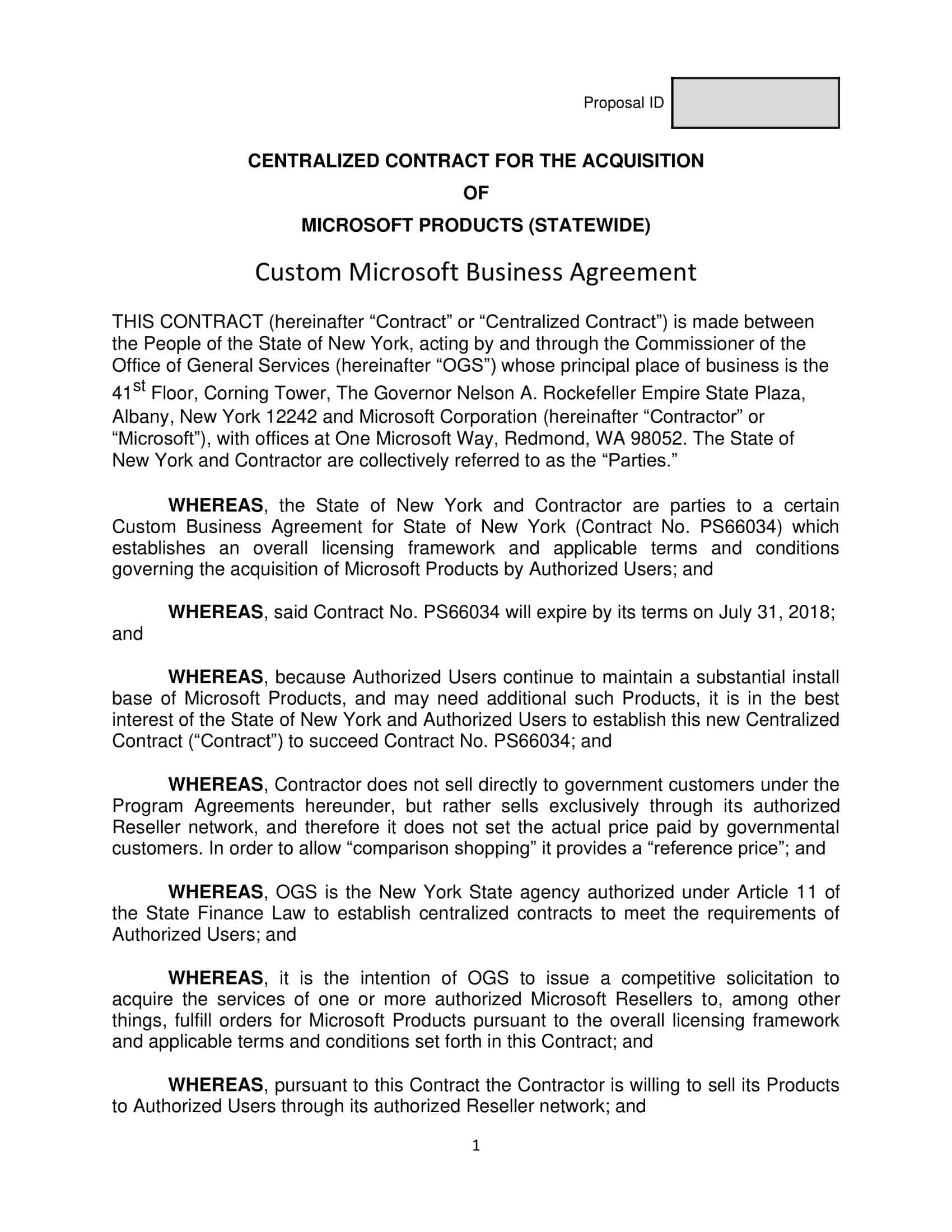




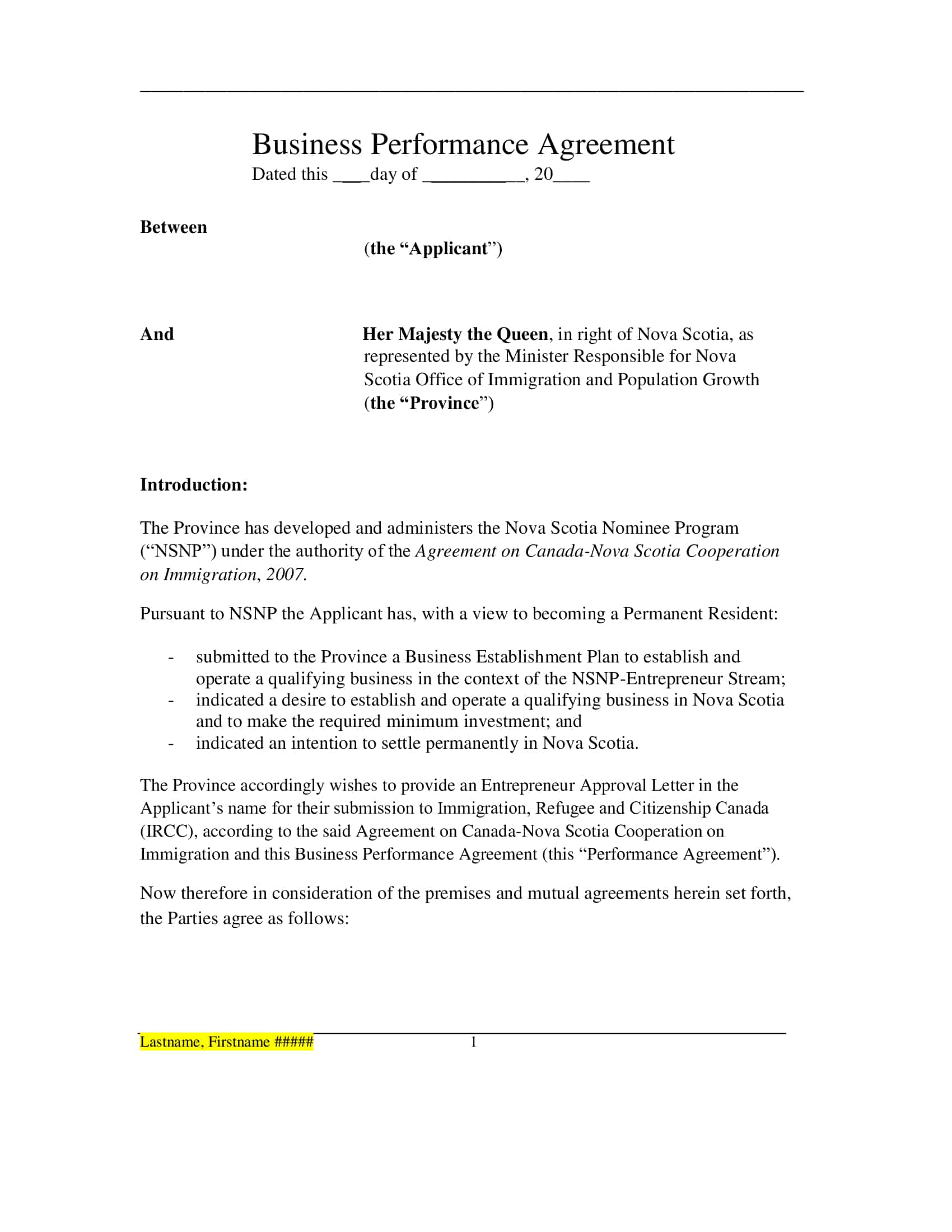


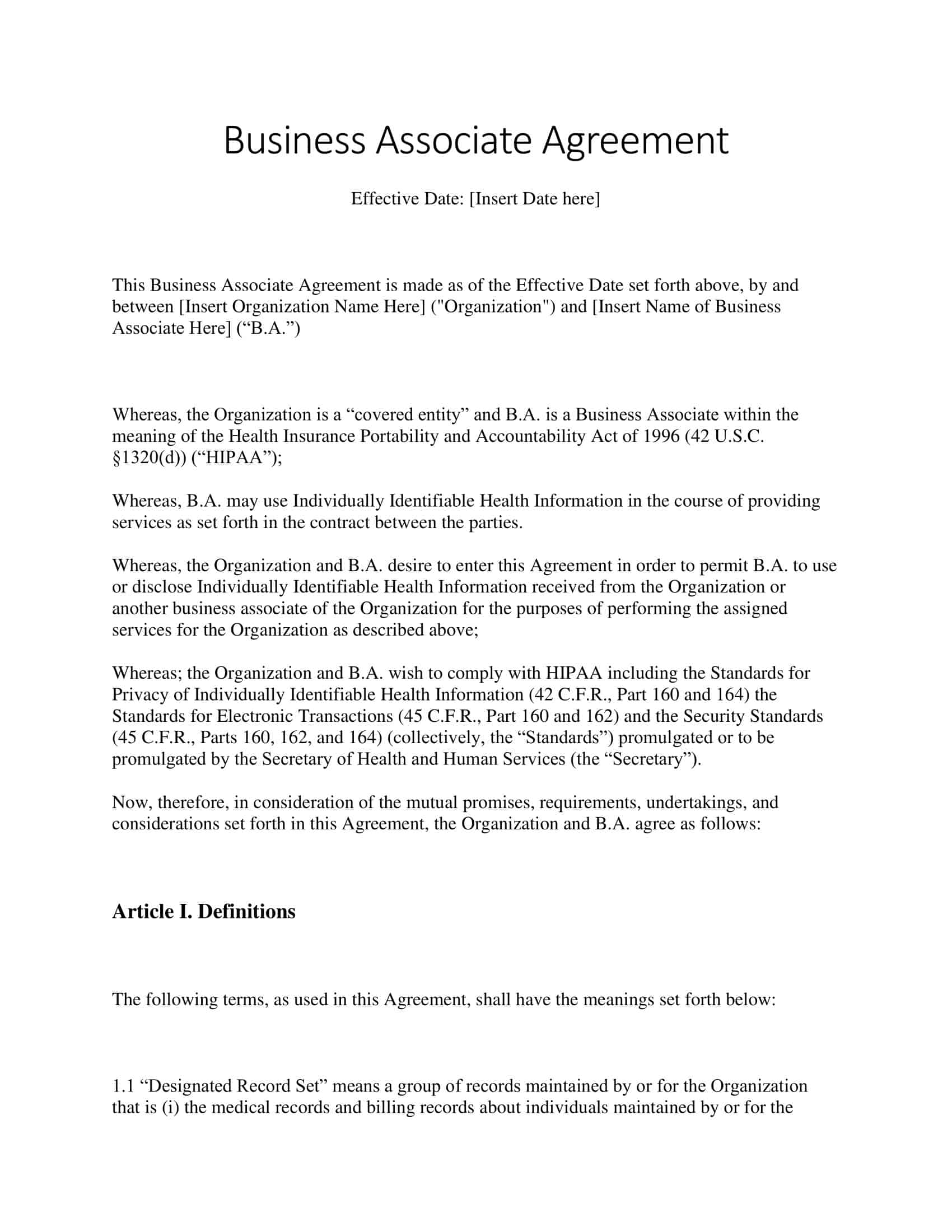



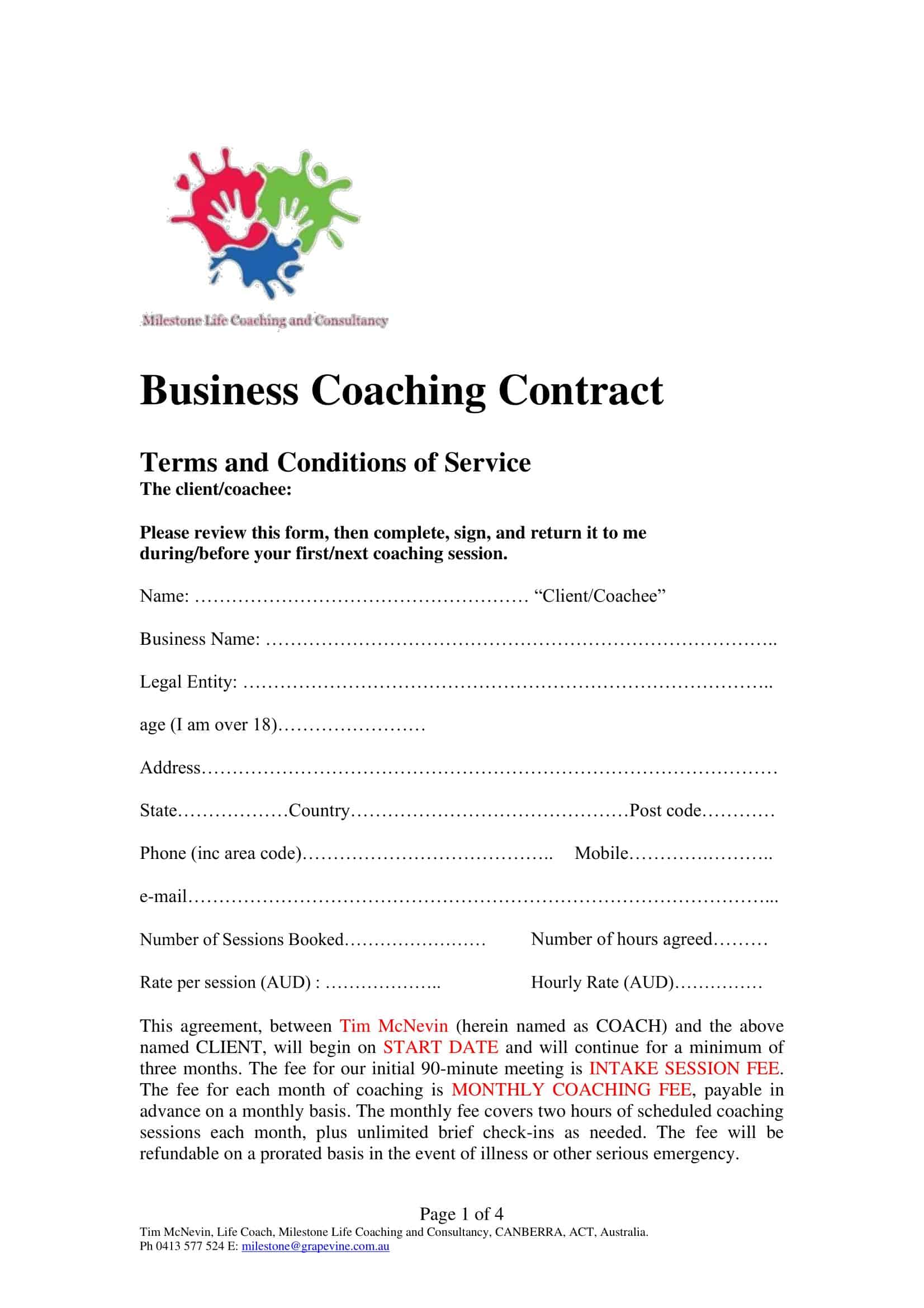



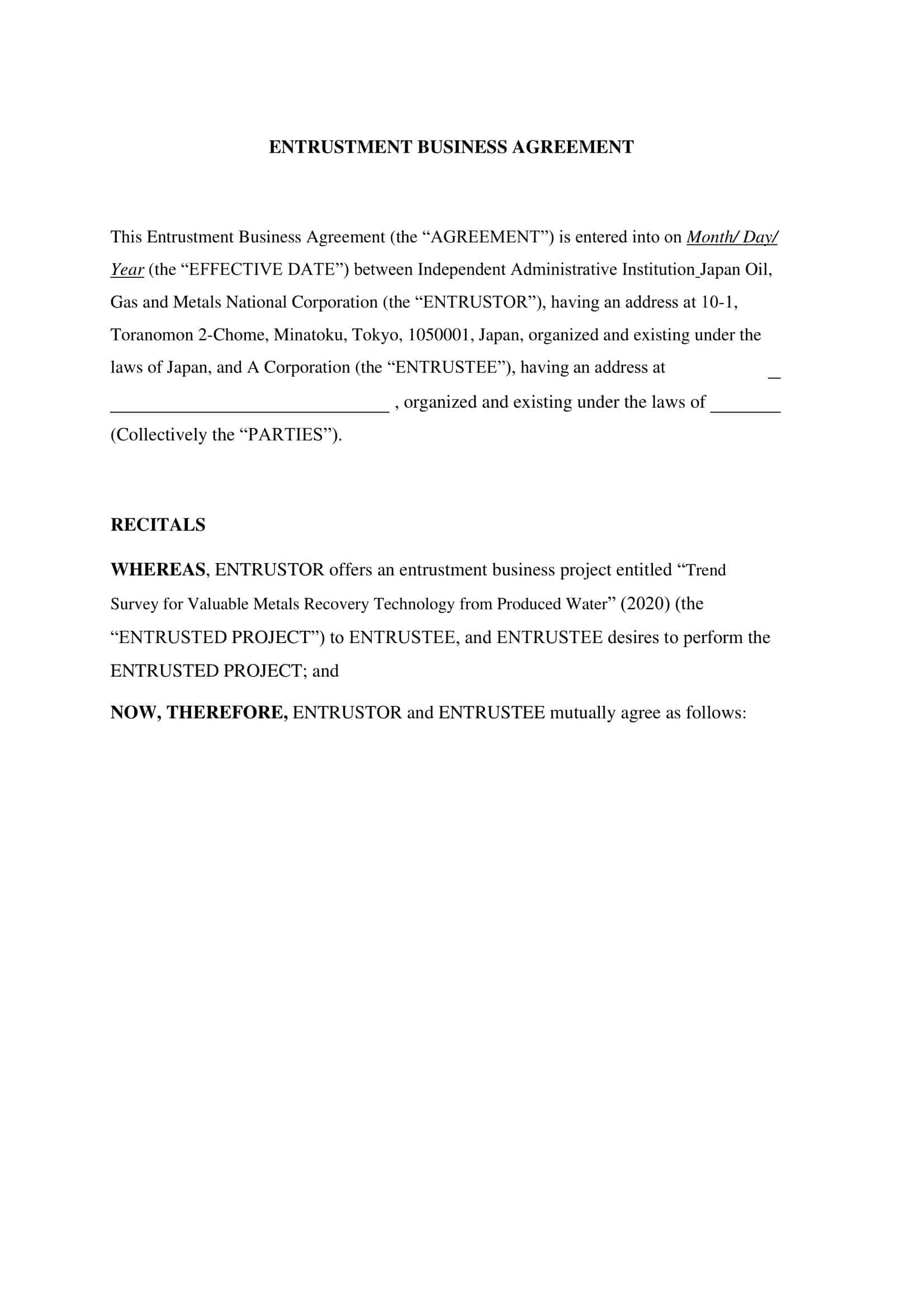

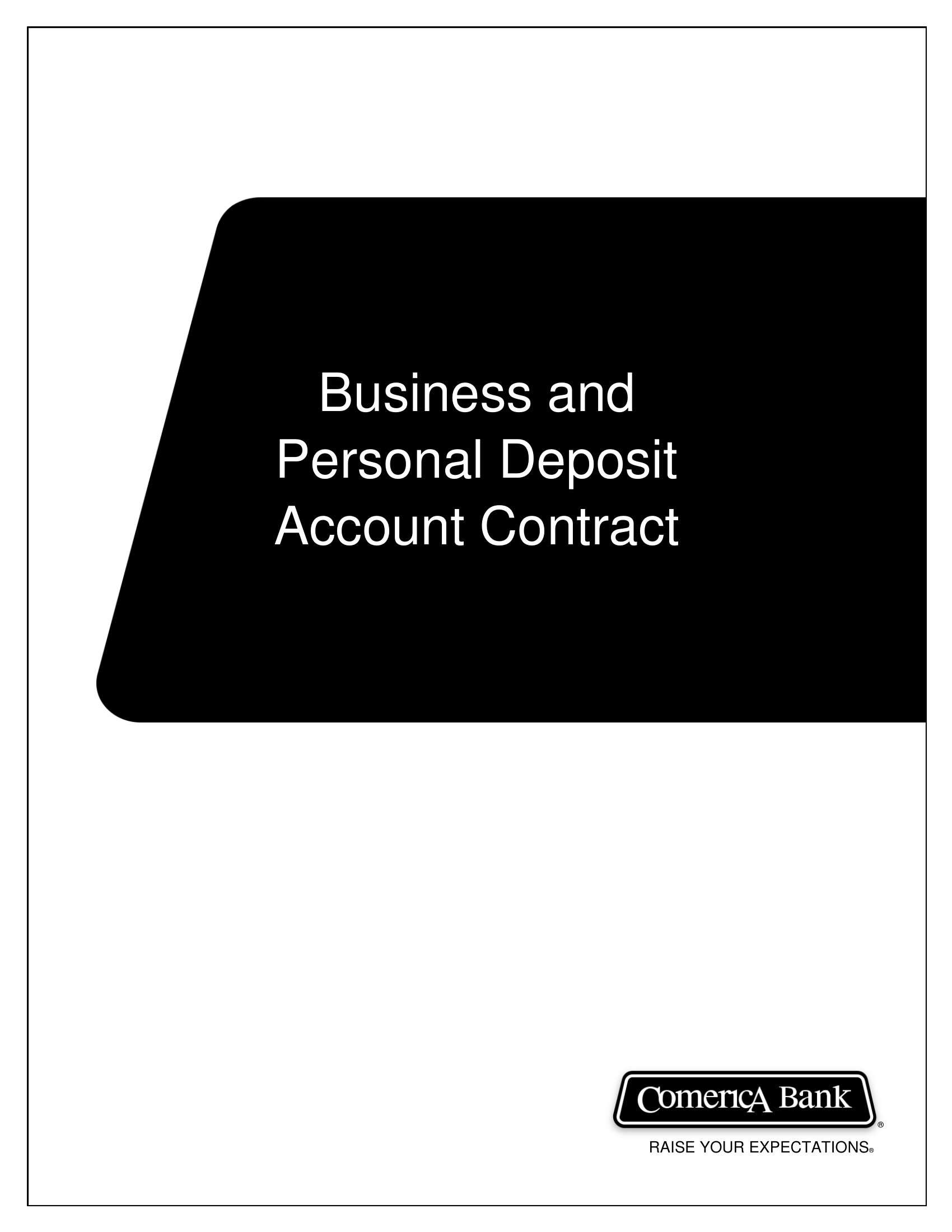



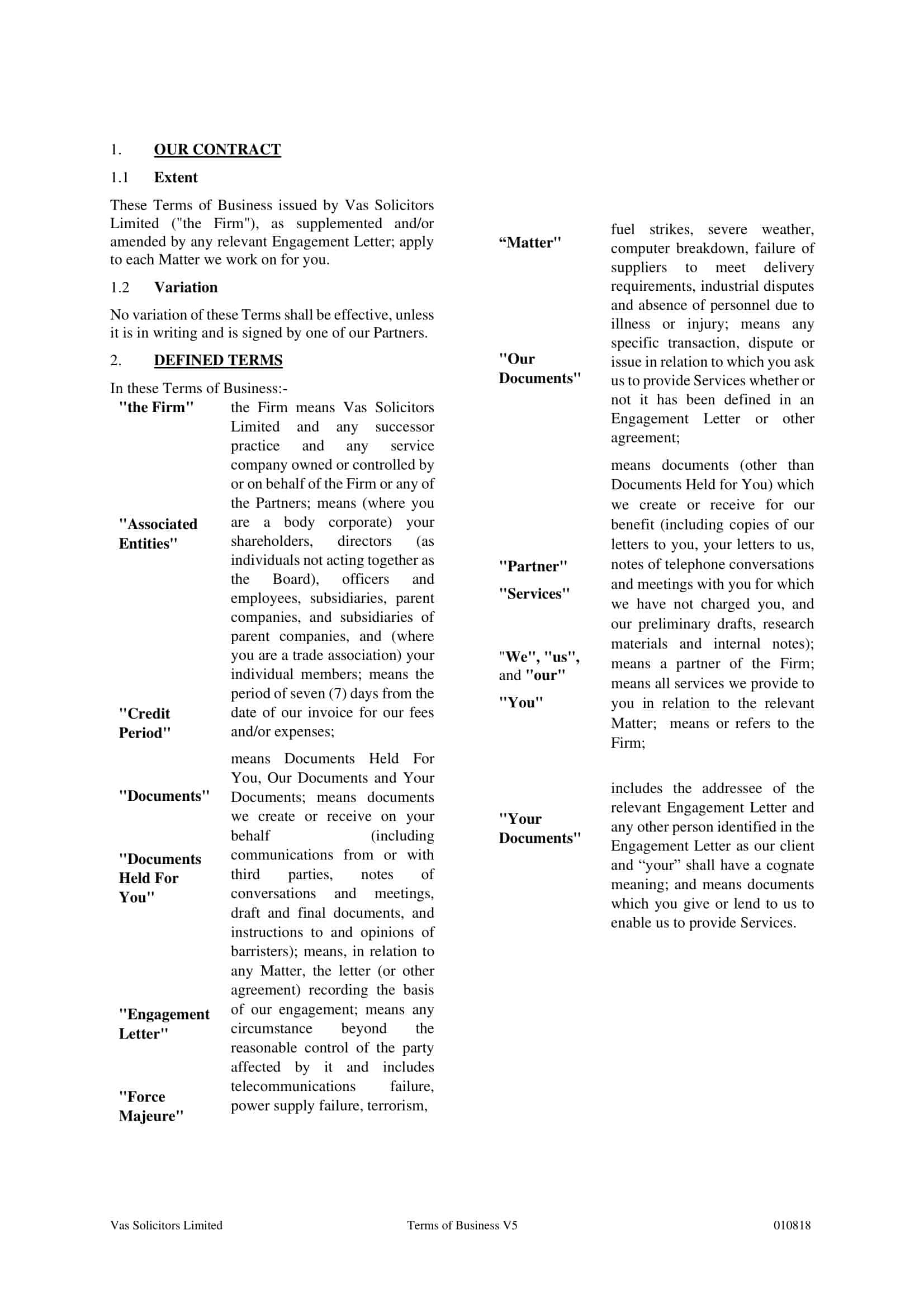
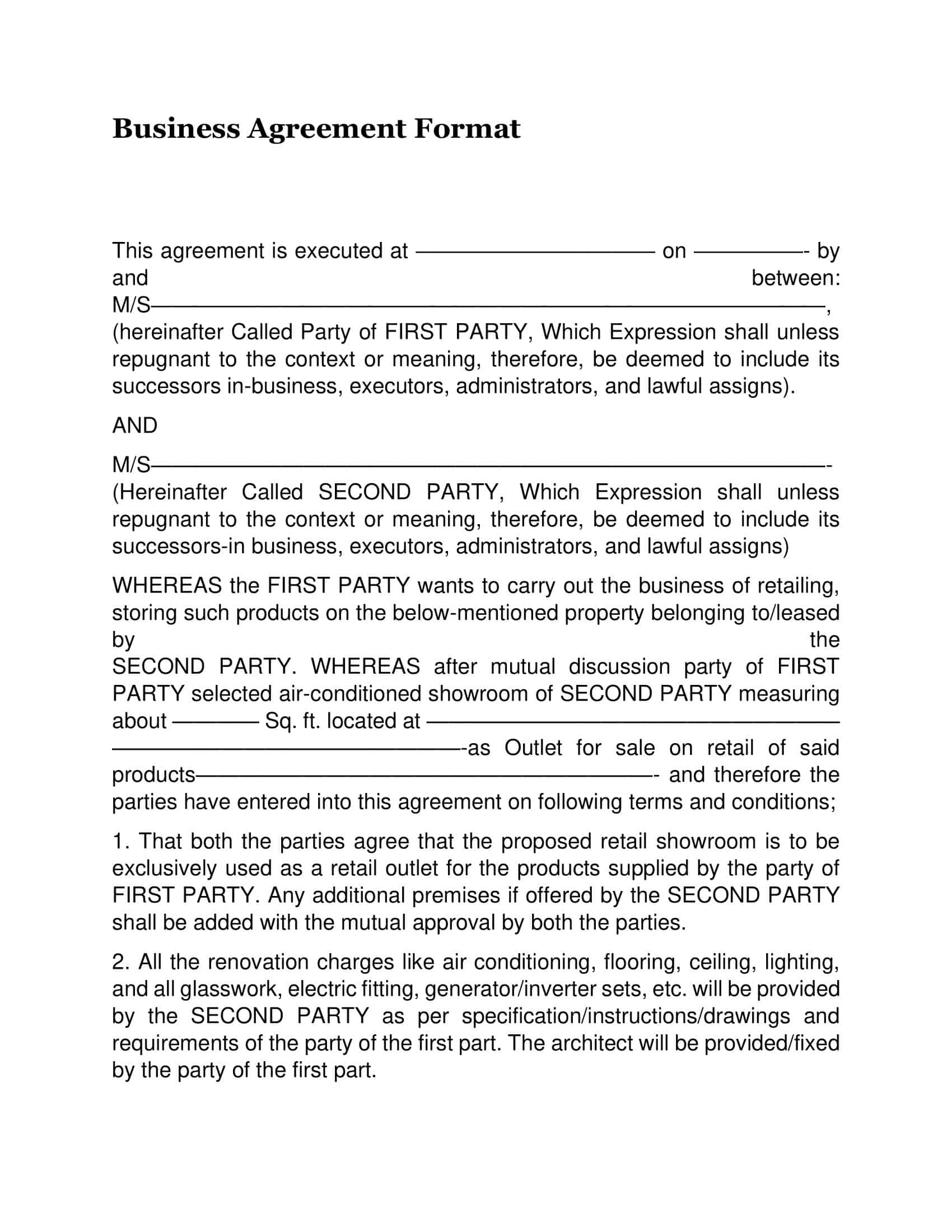







![Free Printable Roommate Agreement Templates [Word, PDF] 1 Roommate Agreement](https://www.typecalendar.com/wp-content/uploads/2023/06/Roommate-Agreement-150x150.jpg)
![Free Printable Credit Card Authorization Form Templates [PDF, Word, Excel] 2 Credit Card Authorization Form](https://www.typecalendar.com/wp-content/uploads/2023/06/Credit-Card-Authorization-Form-150x150.jpg)
![Free Printable Stock Ledger Templates [Excel,PDF, Word] 3 Stock Ledger](https://www.typecalendar.com/wp-content/uploads/2023/08/Stock-Ledger-150x150.jpg)
